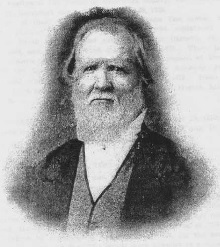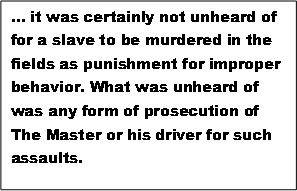
The 1850 Census of Greene County, Alabama shows that the household of Richard Benjamin Borden included 36 souls: Benjamin, his wife Martha, their 7 children (all listed by name on the census list), and 27 slaves (who appear only as an aggregate number). Benjamin, aged 49 at the time of the census, had made the long trek to Greene County from his birthplace of Carteret County, North Carolina about 15 years earlier. In North Carolina, he had grown tobacco, but the depletion of the Carolina soil, as well as the news of available rich acreage in West - Central Alabama after the Native American tribes were forcibly removed from their ancestral lands, encouraged him to move south. He loaded up his family, his slaves, his livestock, and all the household goods they could manage, and set out down the Federal Road. On that pioneer thoroughfare, the Borden caravan journeyed south to Milledgeville, Georgia, then almost due east across the Chattahoochee River through Montgomery, and across to West Alabama. Once settled in Greene County, Benjamin became a cotton farmer.

Benjamin's story is typical of the planter class in ante bellum Alabama. He, his family, and his slaves were part of a flood of immigrants from the depleted tobacco fields to the rich dark soil of Alabama's "Black Belt". For me, Benjamin, who is my great-great-grandfather, is also an avatar for our national tragedy, African Slavery; as well as its aftermath of deeply ingrained racism and discrimination that poisons our modern civic life and corrupts the very fabric of our nation.
Before Benjamin and the other similarly-situated former tobacco farmers came to the Black Belt, the area was sparsely populated. The only white residents between Montgomery and Mobile were traders who had come to buy furs and other items from the Native American tribes. It is tempting to speculate on how Alabama (and United States) history might be different if the young Federal Government had divided the former Indian Lands differently. Instead of allowing Benjamin and the other slaveholders to gobble up thousands of acres at a time at bargain-basement prices, what if the rich land had been parceled out in blocks of 100 acres each to yeoman farmers. This is essentially what took place naturally in New England. The result has been that New England society is far more civilized, far more focused on The Commons today, while Alabama is ... Alabama.
Regardless of what might have happened, what did happen is that Benjamin and all of his contemporaries came, along with their slaves. They quickly established a social structure and a set of shared attitudes that dominated all aspects of life in Alabama before, during, and after the Civil War. Tragically, those structures and attitudes continue to reverberate in the 21st Century. In a philosophical sense, Alabama is still a state peopled by slaves and slaveholders. The legal structure is not exactly the same, but slavery's dark shadow still casts its malevolent influence on every facet of our lives. 21st Century Alabamians, regardless of their politics, ethnicity, or economic status, are enslaved by their history.
Importation of slaves into the United States was legally banned in 1808, so we have to assume that the vast majority of Alabama's slave population in 1850 (342,000 in a total population of 772,000, according to the Census) were native-born. If the 14th Amendment to the U.S. Constitution had been in effect in 1850, they would have been U.S. Citizens. Many of them arrived in Alabama at roughly the same time the Borden family did, when their owners flocked to The Black Belt to grab a share of the rich, newly-available land. Many more were born into Alabama slavery, becoming The Master's property at the time of their birth because he owned their mother.

It is safe to assume that most of the Alabama slaves were field hands, working in The Master's far-flung cotton fields. Their day would begin before dawn, and end only when it was too dark to see. The "driver", or overseer, typically would allow his hands a quick, very skimpy breakfast on the way to the fields, and another small meal before bedtime. If the hands were lucky, they got a few sips of water out of the common bucket during the day. Cruelty and brutality were the order of the day - every day. The driver's whip was always at the ready to discipline any worker who failed to show prompt obedience to all orders, and it was certainly not unheard of for a slave to be murdered in the fields as punishment for improper behavior. What was unheard of was any form of prosecution of The Master or his driver for such assaults. The Master was a law unto himself, with virtually no legal or cultural limits placed on his or the driver's treatment of the slaves.
Life was different, but not necessarily better, for those slaves who were employed in The Master's house, or in his kitchen. Their days were probably even longer than those of the field workers, and they had the misfortune to come into much more frequent contact with The Master and his family. Especially for the younger female slaves, sexual assault from The Master, his sons, and his white employees was an ever-present fact of life. Of course, as was the case with violent assaults on the field hands, no white man was ever prosecuted for assaulting a black woman. Ever.
By definition, Black Belt slaves were profoundly limited in their mobility. A slave faced almost certain lashings from the driver, or even death, if he or she was caught outside the boundaries of the home plantation without a pass. Slave family ties were inherently fragile - The Master would not hesitate to break up a family by selling a father, a mother, or a child, if it was in his economic interest. Slaves were strictly forbidden to receive any form of formal education. In most of the cotton states, it was a crime to teach a slave to read and write.
It is impossible to say with any certainty that Benjamin, his family, or his employees were guilty, or not guilty, of any of the crimes described above. We know that such acts were common on the Black Belt cotton plantations. More importantly, we know with absolute certainty that the very act of enslaving another human being is a barbaric, violent assault, no matter what the treatment may have been after enslavement.

Successive federal administrations somehow managed to turn a blind eye to the atrocities taking place on a daily basis in Alabama and the other slave states, and it was not until the election of Abraham Lincoln that anyone raised any effective opposition against the crimes of the slaveholders. The result of Lincoln's rather mild measures to end slavery was, as we all know too well, secession by the slave states, and a savage, protracted Civil War between North and South that tragically resulted in more than 600,000 battlefield deaths. It was not until the war in Viet Nam that our total combined deaths in all other wars in our history exceeded those of the Civil War.
Finally though, The War did end, and slavery, as a legal construct, ended with Lee's surrender at Appomattox. During the brief Reconstruction period that followed the Civil War, the Old Confederacy actually took some stumbling steps away from its shameful past under the urging of occupying Union troops. Schools were built for freed slaves, and in a few areas, abandoned plantations were broken up and their lands distributed in small farm plots to the former slaves. Black men were elected to state legislatures, and even to Congress.
All that progress ended, and was quickly erased, with the notorious "Compromise of 1877". Congressional Republicans agreed to end Reconstruction in exchange for agreement by the Democrats to accept Rutherford B. Hayes as the winner of the deadlocked Presidential Election of 1876. The departure of the federal troops from the Black Belt meant that the planters were once again in charge. Incredibly, although Benjamin and his class had committed enormous atrocities against the enslaved Africans for decades, as well as instigating and participating in an armed rebellion against the United States, they escaped any form of punishment for their crimes. By the end of the 1870s, they were once again holding all the levers of power in Alabama.
There have been a few faltering steps forward in the 140 years since The Election of 1876: Brown v. Board of Education in 1954 certainly stands out, as does the iconic Bus Boycott just over a year later in my home town of Montgomery. One of the most significant landmarks has to be the passage of the 1965 Voting Rights Act, which literally changed the face of local government in rural Alabama, at least until the sons of the slaveholders started chipping away at its protections. Finally, of course, the Election of 2008 is a beacon of hope. When we elected a black man as our President, we made a statement to the world, and more importantly to ourselves, that we were capable of at least a beginning in the long painful process of putting slavery behind us.
The tragic truth though is that very little has changed in Alabama since the end of the Civil War. Thanks to the 13th Amendment, we no longer have state-sanctioned slavery; but the echoes of that era still envelop all aspects of society. Despite the promises of Brown, most of our black children are still attending school in crumbling sub-standard buildings, while their white peers are housed in gleaming luxurious segregated private schools that are supported at least in part by public funds through complicated tax credit schemes. Our criminal justice system is tilted heavily against the descendants of the slaves. The conviction rate for black defendants in Alabama is more than triple that of their white counterparts. If the Election of 2008 showed us what heights we could reach for, the Election of 2016 let us know how low we can sink.

Slavery and its vicious successor, Jim Crow, have left most of Southern black society in tatters. To be sure, there are heroic exceptions that we all can name. Black educators, musicians, politicians, athletes, business people, clergy, and parents who refuse to be defeated by the crimes committed against their grandparents, their parents, and against themselves. Their self-confidence, determination, and raw courage provide examples for all the rest of us to look up to and follow. For many of their peers, however, life in the former slave states is a bitter pill made up of poor or non-existent education, discrimination in employment and housing, unequal outcomes from the justice system, and very little opportunity to share in the fruits of the world's leading economy.
Nor have the descendants of the slave-owners fared all that well. Benjamin and his peers have taught us, and taught us well, that conflicts should be resolved not by discussion and compromise, but by violence, usually involving firearms. We never seek common ground; but instead we draw lines in the dust and defend them, literally to the death. Especially for white southern men, there is a constant uneasiness, a suspicion that the rest of the world is laughing at us. Guess what guys - they are.
Alabama and its sister slave states have never allowed themselves to recognize how crucial public education is to the success of society. Our wealthy citizens lavishly fund the education of their children, but virtually ignore, or even actively oppose the education of all the rest of society. Ever since Brown, many, perhaps most, white southerners have feared and distrusted public schools. Public schools are those places that we can't keep black students out of anymore, or even black teachers. We can't force students in public schools to recite our prayers. In public schools, we have to consider the rights of everyone, even those with whom we disagree. Public education is The Enemy.
We The People find ourselves today still a nation of slaveholders and slaves - trapped in the bitter adversarial relationships that are the inevitable results of the evils of slavery. Unless we can somehow soon come to grips with our divisions and reconcile them, the legacy of Benjamin Borden and his cohorts will be the downfall of the United States of America.
Thomas R. Borden Waugh, Alabama May 24, 2019
Comments or questions? Send us an email.